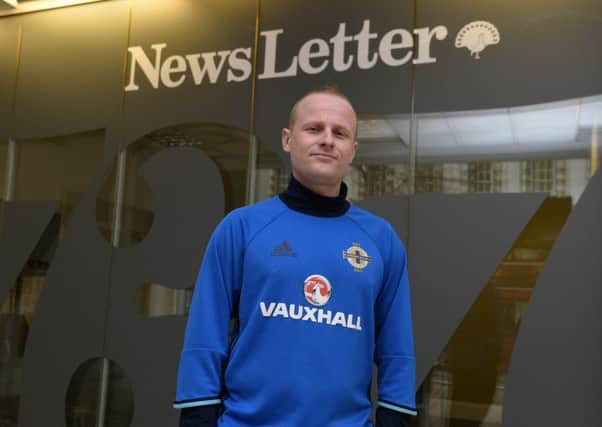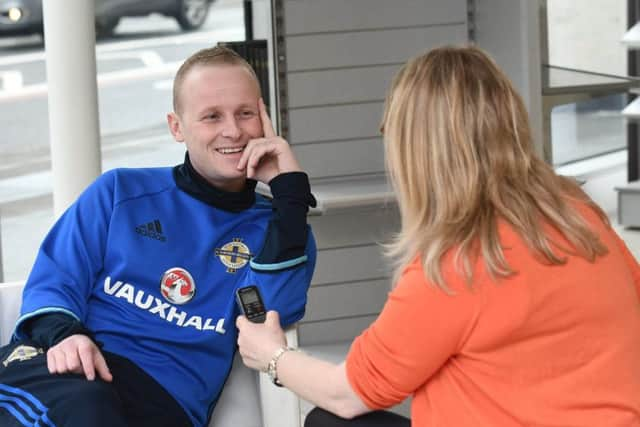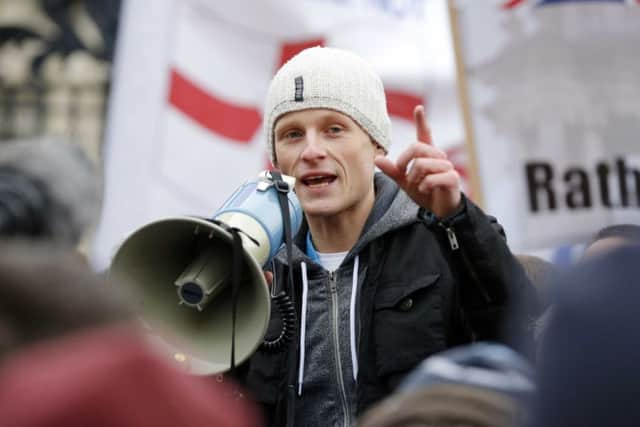THE BIG INTERVIEW: Jamie Bryson


First of all, he did not go on hunger strike when he was held at Belfast’s Musgrave PSNI station following his arrest in 2013 over the union flag protest.
“It’s an absolute myth,” he says, still clearly a bit miffed.
Advertisement
Hide AdAdvertisement
Hide Ad“When I initially went in for questioning I said, ‘no I’m not eating anything because I have no trust in you’, but it wasn’t a hunger strike.”


Nor did he order an Indian takeaway when he decided to call a halt to his ‘hunger strike’.
“Ironically I do eat Indian food now, but at that point in time I didn’t eat Indian food. It just was not true.”
True or not, some wag came up with the moniker ‘Jamie Biriyani’ and it stuck.
Advertisement
Hide AdAdvertisement
Hide AdThere’s been lots written about 27-year-old Bryson, but the only two times he has been angry, he says, was the hunger strike story because “it was making a mockery of me and something which just did not happen,” and another article which claimed he had an uncle who was in the provisional IRA.


“That was lies. The paper had to print a retraction.”
Bryson arrives for our interview wearing an Irish Football Association tracksuit and trainers. He’s slight in stature, trim, no doubt due to his football training and thrice-weekly gym habit, blonde and baby-faced.
A regular on the Stephen Nolan show, where he comes across as self-assured and assertive, in person, there’s a certain reticence.
There are some topics he won’t discuss - his relationship status, for one, and he’s cautious when talking about his two-year-old son Jax, whom he clearly adores.


“He’s a lovely wee boy,” he gushes.
Advertisement
Hide AdAdvertisement
Hide Ad“People can say things about me all day long, I put myself out there so I am fair game, but I would never want him to be the subject of public abuse or some of the disgusting things that were said about him, just because he’s my son.
“He is entitled to live his own life.”
Has becoming a father mellowed him?


“No. My convictions and my opinions are still the same. But it is difficult when you are responsible for a child, and it’s very difficult when people say horrible things about my son.”
Bryson’s own family background is working-class protestant, but not particularly political or staunch.
Born in Donaghadee to David and Lousie, he is an only child and describes enjoying a happy childhood.
Advertisement
Hide AdAdvertisement
Hide Ad“Donaghadee is a nice place to be brought up. I had a good family and good family support.
“My mum is from a farming background in Co Tyrone and my dad is from a working-class estate in Monkstown.
“My parents wouldn’t be politically active and they wouldn’t hold the depth of views and conviction that I would. I’m a bit of a lone voice in that regard. I found politics and my interest in it, off my own accord.”
Bryson came to prominence in December 2012 when Belfast City Council voted to limit the number of days the Union Flag would be flown over the city. He was effectively the spokesperson for the protestors.
Advertisement
Hide AdAdvertisement
Hide AdHe concedes the protest, and all its repercussions, was a “difficult” time for his parents.
“It was an intense period of abuse and ridicule. For your family to have to read horrible things about you, the constant social media abuse and threats being made against you - it wasn’t a nice time.”
And for him, personally, it was a time when he was ‘living off his wits’, day in, day out.
“It was very fluid; every day there was something happening, and everyday you had to be thinking 110 percent because you were doing media interviews and any mistake was going to be picked up on, so you were always running on adrenalin.”
Advertisement
Hide AdAdvertisement
Hide AdLike many others, he was eventually arrested, charged with public order offences and sent to Maghaberry prison for around six weeks, what he refers to as “unjust” imprisonment and “legalised internment”.
For the first couple of weeks he was locked up 23 hours a day - but seems unfazed by the confinement.
“I think a lot of the prison wardens were probably ex-RUC men, and a good majority of them were pretty sympathetic to me, so I didn’t get a hard time in that respect.”
But he adds: “Jail’s jail. You are taken away from your freedom and your family and nobody would ever say it’s easy or a walk in the park. But it gave me time to think and it set me on the path of seeking education (he’s studying an Open University law course) that I am on now, so I suppose they did me a favour in the long run.”
Advertisement
Hide AdAdvertisement
Hide AdBeing so vocal during the protest and acquiring such a high-profile means he still has to be vigilant when he’s out and about.
“I couldn’t go for a night out in Belfast city centre - no way, it would be blue murder!
“You have to watch where you go and when you go; there’s always going to be somebody you come across who’s going to want to come up and have a go at you on the street.
“I remember somebody tried to speed their car up and drive into me outside court one day. I have never been physically attacked but I’m sure some people would if they got you in the right place.”
Advertisement
Hide AdAdvertisement
Hide AdBut not being able to go out in the city centre doesn’t bother him.
“I’m not a socialite and I never was. It’s not something where I sit and think ‘oh, poor me’ I can’t go out clubbing, because I never liked clubbing anyway - so I don’t feel I’m missing anything.”
Indeed, his preference is for old gospel music and country, the likes of Kenny Rogers, Johnny Cash and Nathan Carter, to modern music.
“I’m not into any of this ‘bang, bang nonsense, there’s no emotion in it.”
Advertisement
Hide AdAdvertisement
Hide AdBryson attended Bangor Academy and High School, but wasn’t a particularly enthusiastic or committed scholar.
“I survived, I didn’t excel myself. I was probably more interested in sport than schoolwork.
“If it was something I could go back and do again, I would place more emphasis on my education, but I wanted to be a professional footballer so everything else was a sideshow.”
After school and a stint doing car body repairs, which he “wasn’t very good at”, he became employed as a ‘youth cohesion worker’ in Bangor’s loyalist Kilcooley Estate, dealing with young people with drug and alcohol problems.
“It was an interesting time,” he says wryly.
Advertisement
Hide AdAdvertisement
Hide AdDuring his days working on the estate, Bryson was convicted of carrying a concealed weapon, which he claimed was for self-defence.
“It was a wooden baton I had brought home from holiday in Turkey.
“At that time a number of community workers in Bangor were under threat in relation to a scheme we were doing to take drugs off the streets and we had been threatened a number of times; it was there if anybody came up to attack me.”
Personally, Bryson says he has never had any interest in taking drugs.
Advertisement
Hide AdAdvertisement
Hide Ad“When I was 17 or 18 I was trying to write books while other people were out taking Es. I take a drink now and again - I like a wee vodka or Kopparberg, but I actually have a better night if I go out and I drive - I don’t like the hangovers, and I don’t like the sensation of being out of control.”
Outside of politics, Bryson’s big passion in life is football; he played for Linfield and at county level in the Milk Cup. These days he manages a team in Donaghadee, which works in partnership with other clubs.
‘“We are doing a lot of work in terms of trying to use sport to build a community development infrastructure and some of the stuff that has happened has been fantastic.
“In the nationalist community there is a strong emphasis on GAA and there is a strong community background to that - I don’t sense that to the same degree within the unionist communities.”
Advertisement
Hide AdAdvertisement
Hide AdAt the tender age of 20, Bryson got a taste of political life when he stood as a candidate in the council elections for the Community Partnership political party, garnering just 167 votes. “I don’t think it was the worst result in the world. I don’t look back and view it as a disgrace,” he says.
And he doesn’t rule out a return to politics.
“If the time was right in the future - anything is possible.”
But he adds, “you can sometimes have more influence operating in the gaps; it would surprise you how many of the high profile political figures would speak to me.
“I don’t think many of them would admit in public to being as close to me as they are, but I am wise enough to know that politics is a game of give and take.
Advertisement
Hide AdAdvertisement
Hide Ad“A lot of them seek to use me as a conduit for things to advance their own aims but that goes both ways. I am not some unwilling victim who has been whispered information in the street, I am clear about what I am doing.”